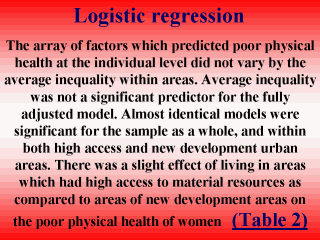 |
Age, gender,
lack of social cohesion and two indicators of formal networks predicted poor physical
health in both logistic models. Interactions between gender, education, and marital status
were tested for each model. None were found to be significant, nor were education or
marital status related to poor health outcome. Personal health habits were not associated
with physical health, except for alcohol consumption, which had an inverse association
with poor physical health. Lack of social cohesion and involvement in religious groups
predicted poor physical health to a similar extent in both models. Participation in a
child-related or social group was marginally significant for the poor health of residents
in high access areas as opposed to those living in new development areas. This suggested
that average inequality may affect membership in one type of formal group differently from
other types, with significant risks for poor health. |
